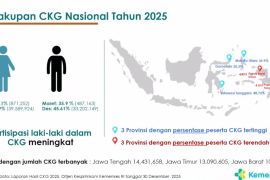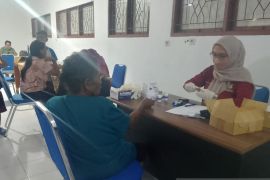The number of the HIV-AIDS sufferers might exceed 500 as many more are still reluctant to undergo health checkups at hospitals or medical centers, head of Belu`s health office, dr.Fabianus Lau said here Monday.
Data obtained from Belu`s AIDS Eradication Mission (KPA), the number of people living with AIDS at the end of 2010 reached 437 people, but within a period of one month, the numbers swelled to more than 500 people.
Dr.Fabianus said of the 500 people, about 100 people died and the rest are still alive and getting assistance and help.
He added the number of people living with HIV-AIDS in Belu district was obtained from the results of blood examination by health officials on patients who came for treatment to various health facilities prepared by the local administrations.
Dr.Fabianus Lau noted, of the total, people infected with HIV reached 253 people, while the rest are people living with AIDS.
Under the category of sex, male patients reach 253 people or 56 percent, while the rest or about 44 percent are female sufferers, he said.
According to dr.Fabianus, HIV-AIDS spreading is like an iceberg which appears on the surface in a small number but it turns out to be a great number.
He said the high number of HIV-AIDS cases in Belu district was caused by several factors, including the location of Belu which is a transit area where residents who want to go to a neighboring country. Other factors included a fact that former Indonesian migrant workers who returned from other country and then committed free sex.
Therefore, the health office urged the local people and those living in surrounding areas to avoid free sex with different partners, not to use hypodermic needles, not to have tattoo and not to consume drugs.
In addition, the people were also asked to have a HIV-AIDS test voluntarily in order to anticipate and find out whether they are positive of HIV-AIDS or not.
Another way is to popularize efforts to prevent or combat HIV-AIDS including treatment for people with action among others to provide reinforcement for not transmitting the virus to other people,"
to the younger generation, both in schools and youth groups dr.Fabianus said.(*)
Editor: Jafar M Sidik
Copyright © ANTARA 2011











